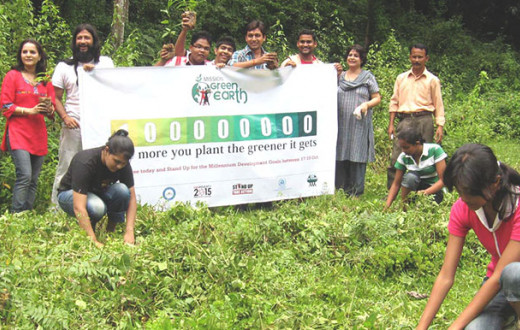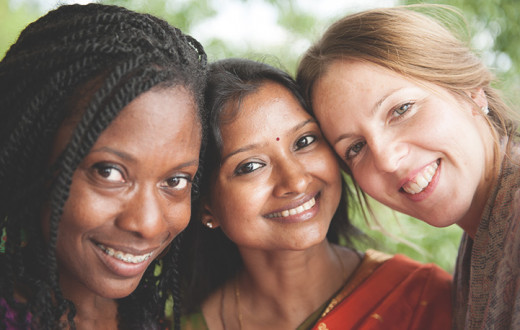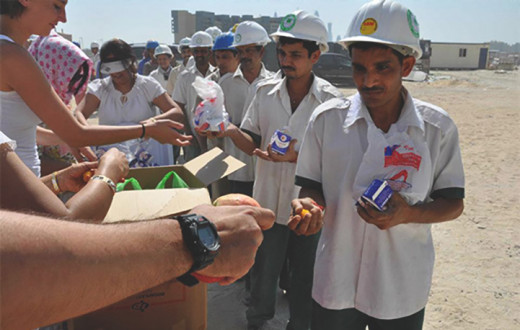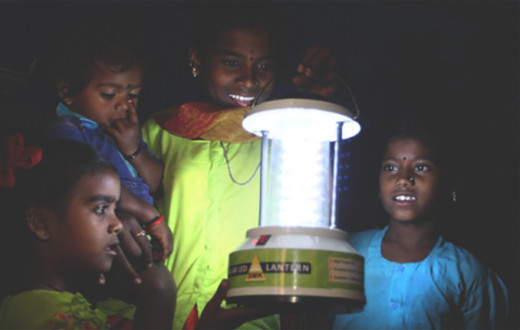In a world where terrorism is affecting every country, Europe has sprung a sad surprise: Belgium reports the largest numbers of youth departing as fighters to the civil war in Syria, leaving their families, especially the mothers, devastated with a terrible sense of loss. Molenbeek, a locality in Brussels, has been the center of this trend.
The Art of Living, Belgium and IAHV (International Association for Human Values) Peacebuilding, which works towards integrated peacebuilding across the world, offered a special course “Healing, Resilience and Empowerment” (HRE) to help Belgian mothers whose children have been lured into recruitment by extremists.

In this interview, Nina Noorali, a faculty of The Art of Living who conducted the pilot HRE Course in February 2016, shares her views and her experiences.
Q: How did the program happen?
A: Belgium is flooded with the influence of ISIS. Being a small country, it has actually the highest number of youth (of Moroccan origin) going to join ISIS, in terms of proportional population, which is very shocking.
I have been working with IAHV Peacebuilding. I started looking for ways in which I could contribute. The recruitment of foreign fighters for Syria and Iraq from among the Belgians was obviously a very big issue. In August 2015, I met Saliha, a mother whose son left two years ago and died three months later in Syria. She shared this whole background, about how difficult it was to carry on her routine with all that pain. I felt that as a trained teacher with The Art of Living, I could do a course for the mothers. We offered the first HRE Course in February 2016.
There were several mothers on the Course, all of them directly affected by the departures of their sons. Some sons died, others are still alive, and some were injured, while there is no news of other sons.
Q: What were some of the issues these mothers had had to face because of the departure of their sons to Syria?
A: For one of the mothers, her family has been through a harrowing time since the time her son left in 2013. Her husband lost his job while she was demoted in her job. They didn’t get much remedial support from the government, though they were in shock. After this, they had to move out because the neighbors were pointing fingers at them and calling them a “terrorist family.”
Q: Do the parents have no prior clue about their sons’ intentions?
A: The sons do not make clear their intentions. This is the tragic story of most of the mothers, most of the parents! They do not tell their mother, “I am going to fight.” Instead, they say “I have got a school trip to Paris!” When they leave in this abrupt fashion, the parents are in complete, utter shock. Later, as they come to realize what has happened, after a few days, or a few weeks sometimes, they are bombarded with memories of their son, bombarded with memories of pictures they have seen from Syria.
Eventually, they might get a phone call from their son saying, “I am in Turkey already! I am on my way to Syria! I'm doing this for you, Mom, so you can go to paradise".
If their son dies, they might receive a 30-second call, and then the family is just left with the devastating news and they have to hang up because the number is jammed, and that is it. It is very difficult even for the brothers and sisters of these boys. They are equally shocked because it was their own sibling and they did not see it coming.
Q: Was there anything specific, anything special in Saliha’s personality or situation that helped her to come out of this and reach out to others so boldly?
A: I think she is very, very strong as a person and she has three other children, but then most of the other mothers too have other children. I think it was just introspection. She saw herself dying inside. And then, she had dreams of her son. She had had an intuition about his death, too. She realized the only way she could continue was to fight for him.
She had taken some initiative with the other mothers to meet and share their stories, their emotions, in a circle. It is called the “Parenting Circle”. She has also opened her own NGO to prevent further departures and violence and all these other consequences. It is called “S.A.V.E. Belgium.”
Saliha has been on TV in different countries around the world, whereas most of the other mothers just isolate themselves, stay home and grieve. But Saliha is, for me, really a super mom. She really channeled her sadness, her despair, towards action. So a lot of people know her and then mothers contact her or she might hear from someone whose son has left for Syria. Then she contacts them directly, gives support, but this aspect of her work is, of course, very discreet.
Q: What were the challenges these women faced as mothers, after their sons left?
A: The main one is the cultural challenge or the human challenge of a mother who thinks she needs to go on for the sake of the other children and because her heart is just not there anymore, she feels like ‘a zombie, a robot’ as some of them have shared with me. They have to wake up, cook, take their children to school and do the laundry. They have to function and the biggest challenge is how to get back that spice of life again, re-light that candle of enthusiasm.
Q: What happens to family life?
A: This situation (of sons departing) has created a lot of tension in married couples. The typical Moroccan man is not used to showing his emotions. There is considerable cultural difference. The Moroccan father is the type to go to work, while the wife has to deal with everything, whether it is herself going to work, cooking, helping the kids with their schoolwork, plus other household chores. So when these sons have gone, a lot of the blame has been laid on the mother by the father.
They are being blamed within the family for not having seen the signs, not having controlled them, not educating them properly. So the women told me they were the ones who really needed help first.
Q: What was the transformative process in the women during the Course?
A: That is a very good question. I thought that as the mothers went through the Course they were going to feel the light, feel recharged. The mothers too thought they were going to cry their heart out and their negative emotions would get washed away. But it did not always happen. So this aspect - of their expectations - was a little difficult to manage.
The second issue was, the participants cannot be expected to simply go from feeling traumatized to becoming happy, because they have lost a son. The healing process is a long one and requires a lot of personal attention and follow up.
Things improved gradually for them. After completing the course, they reported that their energy is high and they are able to sleep. They are able to keep focus.
Women participants on the HRE Course share their experiences
- "I learned to be more in the present moment. I learned that instead of being stuck in the past, it is best to go through the pain and suffering in order to transform it into something better. It's a real life training, this program. It should be accessible to all communities.”
- Mother of 2 sons gone to Syria. - "I loved the program and learned to live in the present and progress in the future with a calm mind and without judgement."
- Sister of 2 brothers captured in Turkey on their way to Syria (No news from them since Sept. 2015). - "This program helps me empty the negative influences and not to feel frustrated."
- Mother whose son passed away 3 months after reaching Syria.
Q: Is there anything else you would like to say about the way in which these women have gone on to help others?
A: Yes. Other than Saliha, one of the mothers is actually trying to help me organize courses in a juvenile prison where her son is. He had been radicalized. We are trying to do something for such youth with the help of the authorities.
Then there is one other lady who joined us. She is also a reporter who works very closely with the mothers. She is helping the mothers’ story go out and is trying to support the mothers in terms of communication.
Q. What can The Art of Living do to facilitate healing and peace?
A: We have designed specific IAHV Peacebuilding Programs to cater for different groups that can be conducted in Belgium. I have been knocking on the doors of the Ministry of Justice, of Education, the Ministry of Youth. Saliha has been very helpful - because she knows I have an uphill task. There are several things on the table that I am hoping to move forward, with the help of these re-energized mothers! We are going step by step.








